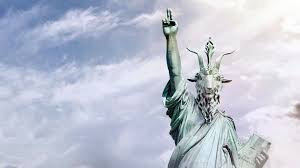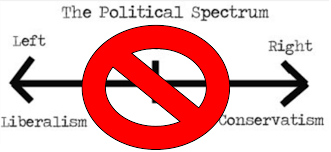
Readings for First Sunday of Lent: Dt. 26: 4-10; Ps. 91: 1-2; 10-15; Rom. 10: 8-13; Lk. 4: 1-13.
Today is the first Sunday of Lent – the annual 40-day process of repentance and purification leading up to Easter (April 4th).
The readings for this Sunday begin on a strong political note. In fact, the Gospel selection issues a powerful summons for all of us to divest of all loyalty to U.S. empire. It reminds us that unless we do so, we end up worshipping Satan instead of God (or Source or the Ground of Being, or the Great Mother) however we might imagine Her.
Put more starkly, the snippet from Luke’s account of Yeshua’s temptation in the desert confronts us with the fact that QAnon is unwittingly correct in saying that the world is run by a cabal of Satan worshippers. It’s governed by a gang best described by OpEdNews’ editor in chief, Rob Kall, as “the devil’s Christians.”
I mean, the readings identify the worship of Satan as a prerequisite for endorsing empire of any kind – be it Rome’s or that of the United States.
The story of Yeshua’s temptation makes it clear that the Master rejected all of that. Even more shocking: subsequent history shows that his “followers” embraced fervently what he rejected so unequivocally. As a result, those pretending to follow Yeshua have been worshipping Satan since at least the 4th century of our era.
To illustrate my point, consider first of all the extent of U.S. empire and secondly the narrative under consideration. Then draw your own conclusions.
U.S. Empire
The best source I’ve come across for detailing the current extent of U.S. empire is Daniel Immerwahr, a professor of history at Northwestern University. A few years ago, he published a book called How to Hide an Empire: A History of the Greater United States. It describes the actual extent of U.S. empire that remains hidden even, as Immerwahr notes, from PhD historians.
Begin with his description of the occult U.S. realm that so concerns him. Immerwahr traces its inauguration to the period immediately after our country’s founding. It was then that settlers incorporated territories seized (in clear violation of treaties) from Native Americans.
Then in 1845, the U.S. absorbed nearly half of Mexico – Texas first and then [after the Mexican American War (1846-’48)], what became Arizona, California, Colorado, Nevada, New Mexico, Utah and Wyoming. By the end of the 19th century, the U.S. had added Puerto Rico, the Philippines, Hawaii, Alaska, Guam, and Wake Island.
If we add to this the implications and actual invocation of the Monroe Doctrine (1823) in order to control the politics of Latin America, we can see forms of U.S. colonialism consistently extending throughout the western hemisphere.
Coups in Africa [e.g. Congo (1961), Ghana (1965), Angola (1970s), Chad (1982)] established U.S. hegemony there. Similar interventions in the Middle East (e.g., Iran in 1953) along with the establishment of Israel and Saudi Arabia as a U.S. proxies controlling political economy throughout their region established United States control there.
Factor in the 800 U.S. military bases peppered across the world and one’s understanding of our empire’s extent expands exponentially. (Immerwahr notes that Russia, by contrast has 9 such bases; the rest of the world has virtually 0).
To understand the sheer numbers involved, think of our continued military presence in South Korea (35,000 troops) Japan (40,000), and Germany (32,000). Besides this, of course, there are the active troops who daily kill civilians and destroy property in Afghanistan, Iraq, Libya, Syria, Somalia, and elsewhere. In total we’re told that there are about 165,000 troops deployed in 150 countries throughout the world – though, in the light of what I’ve just recounted, even that number seems vastly understated.
In any case, all of that describes an extensive, highly oppressive, and extremely violent American Empire.
And our leaders are proud of it. Theodore Roosevelt and Woodrow Wilson thought of colonialism as marvelous. However, by the first decade of the 20th century, politicians became increasingly uncomfortable with “the ‘C’ word,” and exchanged references to colonies for the gentler euphemism, “territories.”
But whatever name we give it, the reality of U.S. empire stands in sharp contrast to today’s Gospel reading and its description of Yeshua’s basic proclamation with its negative judgment on empire and colonialism.
Yeshua Rejects Empire
As a prophet and actual victim of empire, Yeshua made his fundamental proclamation not about himself or about a new religion. Much less was it about the afterlife or “going to heaven.” Instead, Jesus proclaimed the “Kingdom of God.” That phrase referred to what the world would be like without empire – if Yahweh were king instead of Rome’s Caesar. In other words, “Kingdom of God” was a political image among a people unable and unwilling to distinguish between politics and religion.
According to Yeshua, everything would be reversed in God’s Kingdom. The world’s guiding principles would be changed. The first would be last; the last would be first (MT 20:16). The rich would weep, and the poor would laugh. Prostitutes and tax collectors would enter the Kingdom, while the priests and “holy people” – all of them collaborators with Rome – would find themselves excluded (MT 21:31). The world would belong not to the powerful, but to the “meek,” i.e., to the gentle, humble and non-violent (MT 5:5). It would be governed not by force and “power over” but by compassion and gift (i.e., sharing).
That basic message becomes apparent in Luke’s version of Jesus’ second temptation described in today’s Gospel episode. From a high vantage point, the devil shows Jesus all the kingdoms of the earth. Then he says,
“I shall give to you all this power and glory;
for it has been handed over to me,
and I may give it to whomever I wish.
All this will be yours, if you worship me.”
Notice what’s happening here. The devil shows Yeshua an empire infinitely larger than Rome’s – “all the kingdoms of the world.” Such empire, the devil claims, belongs to him: “It has been handed over to me.” This means that those who exercise imperial power do so because an evil spirit has chosen to share his possession with them: “I may give it to whomever I wish.” The implication here is that Rome (and whoever exercises empire) is the devil’s agent. Finally, the tempter underlines what all of this means: devil-worship is the single prerequisite for empire’s possession and exercise: “All this will be yours, if you worship me.”
However, Yeshua responds,
“It is written:
You shall worship the Lord, your God,
and him alone shall you serve.”
Here Yeshua quotes the Mosaic tradition summarized in Deuteronomy 26 to insist that empire and worship of Yahweh are incompatible. Put otherwise, at the very beginning of his public life, Yeshua declares his anti-imperial position in the strongest possible (i.e. scriptural) terms.
Christians Embrace of Empire
Now fast forward to the 4th century – 381 CE to be exact. In 313 Constantine’s Edict of Milan had removed from Christianity the stigma of being a forbidden cult. From 313 on, it was legal. By 325 Constantine had become so involved in the life of the Christian church that he himself convoked the Council of Nicaea to determine the identity of Yeshua. Who was he after all – merely a man, or was he a God pretending to be a man, or perhaps a man who became a God? Was he equal to Yahweh or subordinate to him? If he was God, did he have to defecate and urinate? Seriously, these were the questions!
However, my point is that by the early 4th century the emperor had a strong hand in determining the content of Christian theology. And as time passed, the imperial hand grew more influential by the day. In fact, by 381 under the emperor Theodosius, Christianity had become not just legal, but the official religion of the Roman Empire. As such its job was to attest that God (not the devil) had given empire to Rome in exchange for worshipping Yahweh (not the devil)!
By this process, the devil actually became the Christian God!
Conclusion
Do you get my point here? It’s the claim that in the 4th century, Rome presented church fathers with the same temptation that Yeshua experienced in the desert. But whereas the Great Master had refused empire as diabolical, the prevailing faction of 4th century church leadership embraced it as a gift from God. In so doing they also said “yes” to the devil worship as the necessary prerequisite to aspirations to control “all the kingdoms of the world.” Christians have been worshipping the devil ever since, while calling him “God.”
On the contrary, today’s readings insist that all the kingdoms of the world belong only to God. They are God’s Kingdom to be governed not by “power over,” not by dominion and taking, but by love and gift. Or in the words of Yeshua, the earth is meant to belong to those “meek” I mentioned – the gentle, humble, and non-violent.
Yet, as Dr. Immerwahr attests, those very people living in the West’s former colonies in Latin America, Africa, the Middle East, and South Asia are exactly the ones ceaselessly victimized by the empire historians have so well-hidden from our consciousness.
As described in Immerwahr’s How to Hide an Empire, colonialism and neo-colonialism are diabolic abominations in the eyes of Yeshua’s God. They represent nothing less than a system or robbery currently bent on confiscating the rich resources of the Global South. Authentic followers of Christ can never support such depredations.
The conclusion is inescapable. QAnon is right! The world is in fact run by a cabal of Satanists from the halls of the Vatican to the White House, to the Supreme Court and all those Christians who serve the interests of empire under the aegis of our nation’s armed services and the military-industrial complex. All of them have become the devil’s Christians.
On this First Sunday of Lent, we should pray sincerely and work tirelessly for the defeat of such an abominable system.




